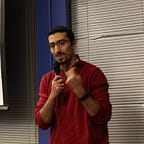AI for Social Good Lab: Striving for a More Inclusive Tech Culture
There is a growing demand for a more diverse workforce, especially in the technology industry. Unfortunately, despite the world’s brightest minds and largest institutions banding together in an attempt to diversify the workforce, female employment rates in STEMM jobs have only slightly improved, and have actually declined for those in Computer Science. As a leading university, McGill has a major role to play in training the future workforce and ensuring they meet the requirements needed in today’s modern age. But how can we accomplish what so many others have only been marginally successful at? To answer this question, we decided to run an experiment; we created a program that would bring together female students in STEMM related fields from across Canada, in an attempt to create a more inclusive tech culture. Thus the inaugural McGill Artificial Intelligence for Social Good Lab came to be.
Why is diversity and inclusivity important for AI in particular?
New technologies are influenced by the people who build them, and if that same technology is poised to become the backbone that sustains our society — promising to alter our lives beyond anything we have ever experienced before — it becomes clear why the people responsible for building AI must be representative of the population it is meant to serve.
Diversifying teams has become an increasingly sought after competitive advantage. Nowadays, it is not so much a question of “what can we do?” but rather “what should we do?” It has been proven that a team which better understands and relates to customers is far more likely to build a successful product. The same reasoning holds true for research teams; a team with a broader range of ideas and ways of thinking is more likely to produce results, and studies are underway to measure the impact of gender diversity in particular.
The big players in tech and venture capital already understand this, which is why Google, Microsoft’s Maluuba, BDC, Element AI, Real Ventures among others were quick to join. That’s not to say startups did not value diversity just as much; we had amazing workshop leads coming in from Shopify, Sportlogiq, TandemLaunch, Botler, and Dialogue. Even UNICEF’s data team participated, giving a talk on how they plan to improve their data collection and use Machine Learning in their future initiatives.
A huge thanks to all of our amazing sponsors for making this possible!
For the first cohort, we focused mainly on undergraduates with no prior AI or ML experience in order to give them a solid foot into the field, although there were graduate and PhD level students in attendance as well. Even though it was a “lab” because it was an experimental project, it was more akin to a bootcamp; participants underwent two rigorous weeks of theory work under the tutelage of our world-renowned faculty from the Reasoning and Learning Lab, with our partners coming in at least once a day to give workshops on their area of expertise.
Shoutout to Professor Doina, Professor Joelle, Pierre-Luc, Ethan, Sanjay, and Emmanuel!
Halfway into the program, in order to better integrate the participants with the broader Montreal tech and startup community, we hosted a public hackathon with the “AI for Social Good” theme. Within two weeks we already had over 200 applications from a multitude of fields, including sociology, law, and environmental sciences; the Montreal community is clearly embracing its emerging role as an AI Hub. The hackathon produced some very impressive projects, including a chatbot that helps diagnose early stages of speech impairment.
Merci à Desjardinslab de nous avoir prêté son espace
With a small hands-on project under their belt and the mentors by their side, our lab participants spent the final 10 days of the program working on a prototype for an AI application, with the aim of ameliorating some social issues. At the end of the program, they had the chance to present their work to everyone involved in the lab and the Montreal tech community. Some of the projects resulting from the lab were a waste classifier, a bias detection extension, and a bike redistribution system. Given the narrow time frame and the fact that some had absolutely no idea what ML or AI meant prior to the lab, we are very proud of the progress they made.
Snapart: an app that uses art to humanize people across borders of conflicting countries
Was the experiment a success? It has been almost a month since the wrap-up event, so we had a lot of time to gather feedback and identify areas we could improve on. The following quote captures the results quite nicely, and assured us that we are on the right track:
“Definitely exceeded my expectations. This is the best extracurricular/skill development program I’ve ever taken part in. I feel like it will have a more meaningful impact on my career and confidence in my skill set than the past three years of my Comp Sci undergraduate degree.”
Looks like we have next year’s work cut out for us!
Once again, we would like to offer our heartfelt thanks to everyone involved in the lab, you are the reason this was all possible. May this initiative be the first of many, as we continue taking steps towards a more inclusive tech culture.
This initiative was organized by BETA, the McGill Innovation Collective. For more info on our future projects, check out our website http://innovation.mcgill.ca, Facebook, or Twitter.
